Businesses are constantly looking for new ways to enhance the customer experience and grow in the competitive market.
AI chatbots are one of the latest technologies, transforming the way organizations interact with their customers, and expanding growth opportunities for both the existing businesses and the startups.
These AI chatbots offer immediate assistance and information to the users. AI development services helps businesses automate repetitive tasks, which reduces response time while giving personalized support for maximum customer satisfaction, thus growing one’s business.
The blog emphasizes the key advantages AI chatbot into your business strategy in a way that amplifies customer engagement and enhances operational efficiency.
What are AI Chatbots?
AI Chatbots are AI-powered bots programmed to communicate like humans. They can engage a user in either a text or voice-based conversation by responding to queries.
Unlike typical chatbots which work based on some predefined script; AI-based chatbots leverage NLP to understand user inputs and respond in a much more natural and conversational manner. In turn, it also enables them to cover a greater range of questions and provide more personalized support.
Therefore, businesses integrating chatbots into their platforms are offering better customer experience by automating menial tasks.
Types of AI Chatbots
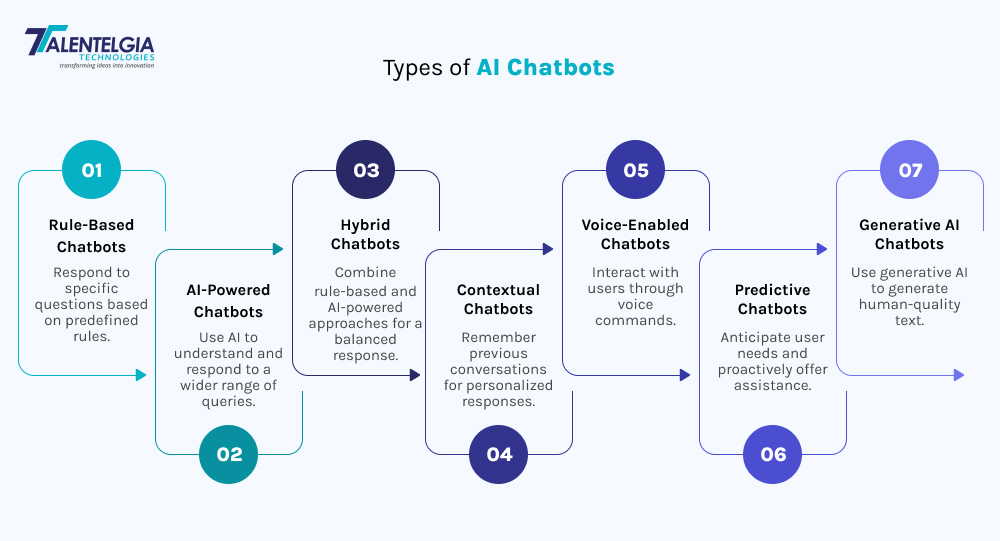
AI chatbots come in all flavors, each designed to cater to different needs and serve specific purposes. Whether it be enhancing customer service, streamlining business operations, or personalizing an experience, it’s important to learn about the different types of AI chatbots.
Top 6 Benefits of Using Chatbots
AI chatbots have become an essential tool for companies looking to improve their customer interactions and operations. These smart services don’t just work; they provide several benefits and can change the way business is done.
“Artificial intelligence is not a substitute for human intelligence; it is a tool to amplify human creativity and ingenuity.”
– By Fei-Fei Li (Co-Director, Stanford Institue-Human Centered Artificial Intelligence)
1. Improved Customer Service and Support
One of the biggest advantages of AI chatbots is the making of customer service available 24/7. While human agents require breaks to rest, sleep, or time off, AI chatbots do not. Customers can be served at any time. This kind of on-the-clock availability is especially strong for today’s global market. Customers today can call from different time zones.
AI chatbots are not only making the services available 24/7 but are also very productive. At times, these bots can handle many queries of a customer which would become a challenge for even experienced human agents. This also leads to shorter waiting times for the customer, enhancing rates of satisfaction. Customers are pleased with the prompt response to their questions.
Additionally, these AI chatbots can be programmed to handle customer services like answering frequently asked questions and troubleshooting issues with products/services. They can pull information from a huge database of information in a split second, giving the customers detail-rich, accurate answers.
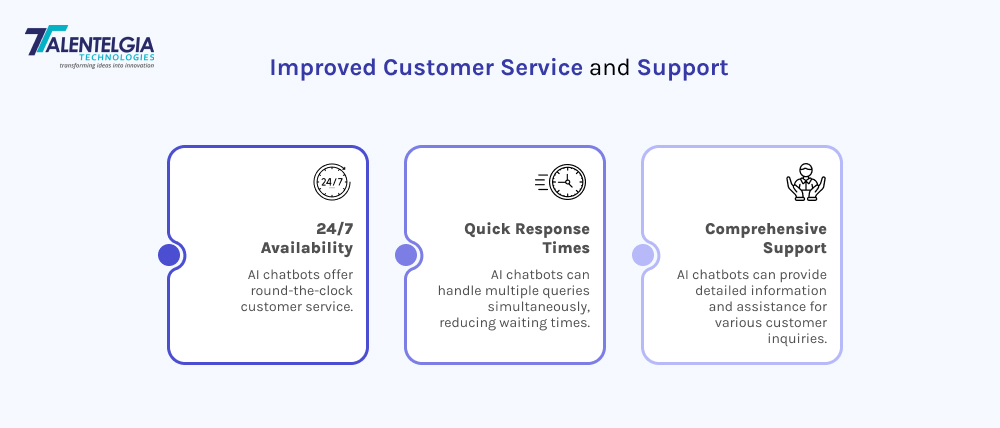
2. Cost Efficiency and Resource Optimization
One of the predominant concerns for any business is cost reduction. AI chatbots reduce costs for conducting several other operations, including customer services. Automating routine inquiries and processes, can reduce the need of a huge workforce in customer support for businesses, reducing the workforce cost.
AI chatbots can really become a game-changer for small businesses and startups working with limited budgets. It can handle customer interactions, answering questions, and even selling instead of a full-time support team. This initial investment for the development and deployment of an AI chatbot could be quickly returned in the savings of labor expenses in most businesses.
AI chatbots cut down operational costs by lowering the frequency of errors. Human errors such as sharing wrong information can lead to miscommunication and that can be detrimental at times. They can prove to be costly, as any one could lose customers or business over this due to dissatisfaction. On the other hand, AI chatbots share information correctly and reduce errors and costs.
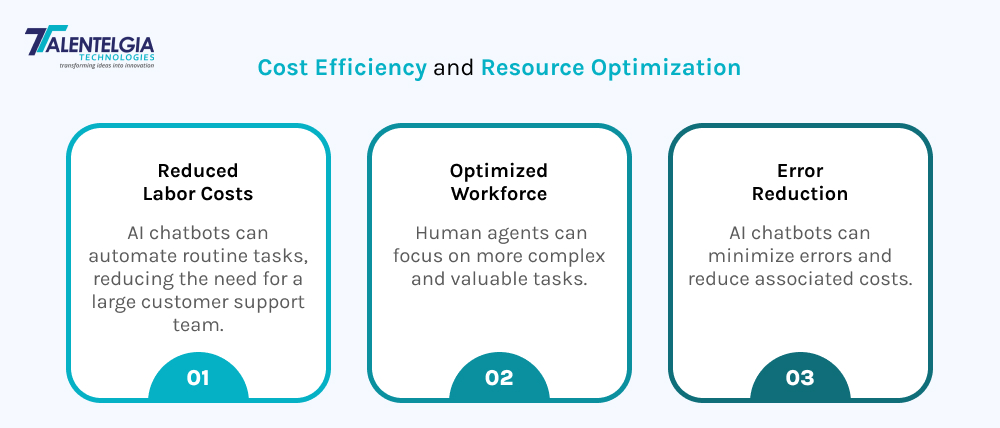
3. Personalization and Improved Customer Engagement
Personalization drives customer engagement and loyalty. It has now become a need of the customers as the big brands are offering customized experiences. AI-chatbots have changed with the sophisticated algorithms and machine learning capabilities
For instance, an AI chatbot could remember previous customer interactions, their preferences, and purchase history. The agent might recognize the customer by name when they come back and may be actually recommending products or services based on their past behavior or offering loyalty discounts.
Moreover, AI chatbots can naturally interact with clients, making the interaction feel less transactional and more relational. They can use NLP to understand and respond to complex queries, allowing for a more fluid and natural conversation to ensue. This not only leads to better customer satisfaction but also encourages customers to devote more time to the brand through product browsing, asking questions, or shopping.
4. Scalability and Flexibility
With every growing business, there is an increase in customer touchpoints. It is hard for live agents to deal with that increased load, especially for companies with very rapid growth. Scalability possible with an AI chatbot is difficult to achieve with human agents. Whether your company is dealing with ten queries from customers or ten thousand, an AI chatbot will adapt seamlessly without affecting response time and quality.
Flexibility is another critical advantage of AI chatbots. They can be easily integrated with any system, whether it lies within CRM or e-commerce, or even social media. With the options for updating or reprogramming AI chatbots becomes feasible with the growing business needs. For example, if a new product is launched, then the chatbot can be instantly trained about information without any time lag, thus ensuring that customers receive the latest information about that product.
This scalability and flexibility of AI chatbots make it a real-time and valuable business asset when making efforts to grow and adapt to changing market conditions.
5. Data Collection and Insights
Competing in a data-driven world requires an understanding of your customers. AI chatbots are a great tool for collecting and analyzing customer data. Interactions with chatbots generate valuable data, which provides insight into customer behavior, preferences, and pain points to be used later for business strategies, product development, services, and marketing.
For example, by analyzing chatbot interaction, a business is able to find out that a particular feature of a product interests many customers.
Such information can be used in developing new features, updating the existing features, or may even change the way in which a product is marketed. AI chatbots have the ability to monitor both tone and the text of the discussion in order to gauge customer sentiment. This gives businesses a competitive edge.
6. Continuous Improvement with Machine Learning
Chatbots are not static; they get better with time. Chatbots use Machine learning This helps them discern patterns and trends, which they use to optimize responses and decision-making processes.
For example, when an AI chatbot interacts with a question it cannot answer, it can be programmed to flag such an interaction for human agents or developers. They can then go through that conversation and give the right answer. This helps the chatbot learn over time and thereafter, the chatbot will be able to provide answers to such queries on a standalone basis.
This continuous process makes sure the AI Chatbot is up-to-date and effective in serving the customer’s needs in a business environment that is continuously changing.
How do AI chatbots work?
AI chatbots break down the text or conversation to understand what the user is asking or saying. They use Natural Learning Processing for it as it helps chatbots recognize language patterns, context, and context.
Here’s a simple breakdown of how they work:

Data Processing: The chatbot understands the user query and processes the data, helping them to decide how to respond. AI chatbots are equipped with algorithms that allow them to search for information, match questions with the right answers.
Create an answer : After the action, the chatbot will create an answer. If it is a simple question, the chatbot will give a simple answer. It will guide the user through the steps for further requests or offer another way to clarify the user’s needs for complex queries.
Learn and Improve: AI chatbots don’t just answer questions, they also learn from each conversation. They use machine learning to analyze past conversations to improve future responses. Over time, this learning process allows the chatbot to become more accurate, understand complex questions, and provide more helpful responses.
Update for context: AI chatbots can update their responses based on the context of the conversation. For example, if the user is stressed, the chatbot will be more responsive. If the conversation is for business purposes, the chatbot can cut through the noise.
This change makes the interaction more natural and personal. information. They are designed to constantly learn and update to keep them current and useful in the changing digital environment.
Why Should You Use AI Chatbots?
AI chatbots are available 24/7 ensuring instant responses. This also means that customers in different time zones can get help whenever they need it.
This makes customers feel valued and understood, leading to better satisfaction. AI Chatbots can work on multiple sessions at once without getting tired. Human teams do not easily meet this type of scalability.
This will improve your products, services, and overall customer experience. The more they interact with customers, the better they can understand and answer questions, improving the customer experience. Furthermore, good customer service helps you stay ahead in the competitive marketplace.
Conclusion
The benefits of using AI chatbots are vast as they constitute a welcome addition to any business.
From improved customer service to cost reduction, personalization, and data insight provision, AI chatbots are a solution to numerous challenges that confront businesses in this day and age.
And since AI technology is continually advancing, the capabilities and benefits of chatbots grow so significantly that it becomes indeed imperative as a tool for today's businesses.


 Healthcare App Development Services
Healthcare App Development Services
 Real Estate Web Development Services
Real Estate Web Development Services
 E-Commerce App Development Services
E-Commerce App Development Services E-Commerce Web Development Services
E-Commerce Web Development Services Blockchain E-commerce Development Company
Blockchain E-commerce Development Company
 Fintech App Development Services
Fintech App Development Services Fintech Web Development
Fintech Web Development Blockchain Fintech Development Company
Blockchain Fintech Development Company
 E-Learning App Development Services
E-Learning App Development Services
 Restaurant App Development Company
Restaurant App Development Company
 Mobile Game Development Company
Mobile Game Development Company
 Travel App Development Company
Travel App Development Company
 Automotive Web Design
Automotive Web Design
 AI Traffic Management System
AI Traffic Management System
 AI Inventory Management Software
AI Inventory Management Software
 AI Software Development
AI Software Development  AI Development Company
AI Development Company  AI App Development Services
AI App Development Services  ChatGPT integration services
ChatGPT integration services  AI Integration Services
AI Integration Services  Generative AI Development Services
Generative AI Development Services  Natural Language Processing Company
Natural Language Processing Company Machine Learning Development
Machine Learning Development  Machine learning consulting services
Machine learning consulting services  Blockchain Development
Blockchain Development  Blockchain Software Development
Blockchain Software Development  Smart Contract Development Company
Smart Contract Development Company  NFT Marketplace Development Services
NFT Marketplace Development Services  Asset Tokenization Company
Asset Tokenization Company DeFi Wallet Development Company
DeFi Wallet Development Company Mobile App Development
Mobile App Development  IOS App Development
IOS App Development  Android App Development
Android App Development  Cross-Platform App Development
Cross-Platform App Development  Augmented Reality (AR) App Development
Augmented Reality (AR) App Development  Virtual Reality (VR) App Development
Virtual Reality (VR) App Development  Web App Development
Web App Development  SaaS App Development
SaaS App Development Flutter
Flutter  React Native
React Native  Swift (IOS)
Swift (IOS)  Kotlin (Android)
Kotlin (Android)  Mean Stack Development
Mean Stack Development  AngularJS Development
AngularJS Development  MongoDB Development
MongoDB Development  Nodejs Development
Nodejs Development  Database Development
Database Development Ruby on Rails Development
Ruby on Rails Development Expressjs Development
Expressjs Development  Full Stack Development
Full Stack Development  Web Development Services
Web Development Services  Laravel Development
Laravel Development  LAMP Development
LAMP Development  Custom PHP Development
Custom PHP Development  .Net Development
.Net Development  User Experience Design Services
User Experience Design Services  User Interface Design Services
User Interface Design Services  Automated Testing
Automated Testing  Manual Testing
Manual Testing  Digital Marketing Services
Digital Marketing Services 
 Ride-Sharing And Taxi Services
Ride-Sharing And Taxi Services Food Delivery Services
Food Delivery Services Grocery Delivery Services
Grocery Delivery Services Transportation And Logistics
Transportation And Logistics Car Wash App
Car Wash App Home Services App
Home Services App ERP Development Services
ERP Development Services CMS Development Services
CMS Development Services LMS Development
LMS Development CRM Development
CRM Development DevOps Development Services
DevOps Development Services AI Business Solutions
AI Business Solutions AI Cloud Solutions
AI Cloud Solutions AI Chatbot Development
AI Chatbot Development API Development
API Development Blockchain Product Development
Blockchain Product Development Cryptocurrency Wallet Development
Cryptocurrency Wallet Development About Talentelgia
About Talentelgia  Our Team
Our Team  Our Culture
Our Culture 
 Healthcare App Development Services
Healthcare App Development Services Real Estate Web Development Services
Real Estate Web Development Services E-Commerce App Development Services
E-Commerce App Development Services E-Commerce Web Development Services
E-Commerce Web Development Services Blockchain E-commerce
Development Company
Blockchain E-commerce
Development Company Fintech App Development Services
Fintech App Development Services Finance Web Development
Finance Web Development Blockchain Fintech
Development Company
Blockchain Fintech
Development Company E-Learning App Development Services
E-Learning App Development Services Restaurant App Development Company
Restaurant App Development Company Mobile Game Development Company
Mobile Game Development Company Travel App Development Company
Travel App Development Company Automotive Web Design
Automotive Web Design AI Traffic Management System
AI Traffic Management System AI Inventory Management Software
AI Inventory Management Software AI Software Development
AI Software Development AI Development Company
AI Development Company ChatGPT integration services
ChatGPT integration services AI Integration Services
AI Integration Services Machine Learning Development
Machine Learning Development Machine learning consulting services
Machine learning consulting services Blockchain Development
Blockchain Development Blockchain Software Development
Blockchain Software Development Smart contract development company
Smart contract development company NFT marketplace development services
NFT marketplace development services IOS App Development
IOS App Development Android App Development
Android App Development Cross-Platform App Development
Cross-Platform App Development Augmented Reality (AR) App
Development
Augmented Reality (AR) App
Development Virtual Reality (VR) App Development
Virtual Reality (VR) App Development Web App Development
Web App Development Flutter
Flutter React
Native
React
Native Swift
(IOS)
Swift
(IOS) Kotlin (Android)
Kotlin (Android) MEAN Stack Development
MEAN Stack Development AngularJS Development
AngularJS Development MongoDB Development
MongoDB Development Nodejs Development
Nodejs Development Database development services
Database development services Ruby on Rails Development services
Ruby on Rails Development services Expressjs Development
Expressjs Development Full Stack Development
Full Stack Development Web Development Services
Web Development Services Laravel Development
Laravel Development LAMP
Development
LAMP
Development Custom PHP Development
Custom PHP Development User Experience Design Services
User Experience Design Services User Interface Design Services
User Interface Design Services Automated Testing
Automated Testing Manual
Testing
Manual
Testing About Talentelgia
About Talentelgia Our Team
Our Team Our Culture
Our Culture
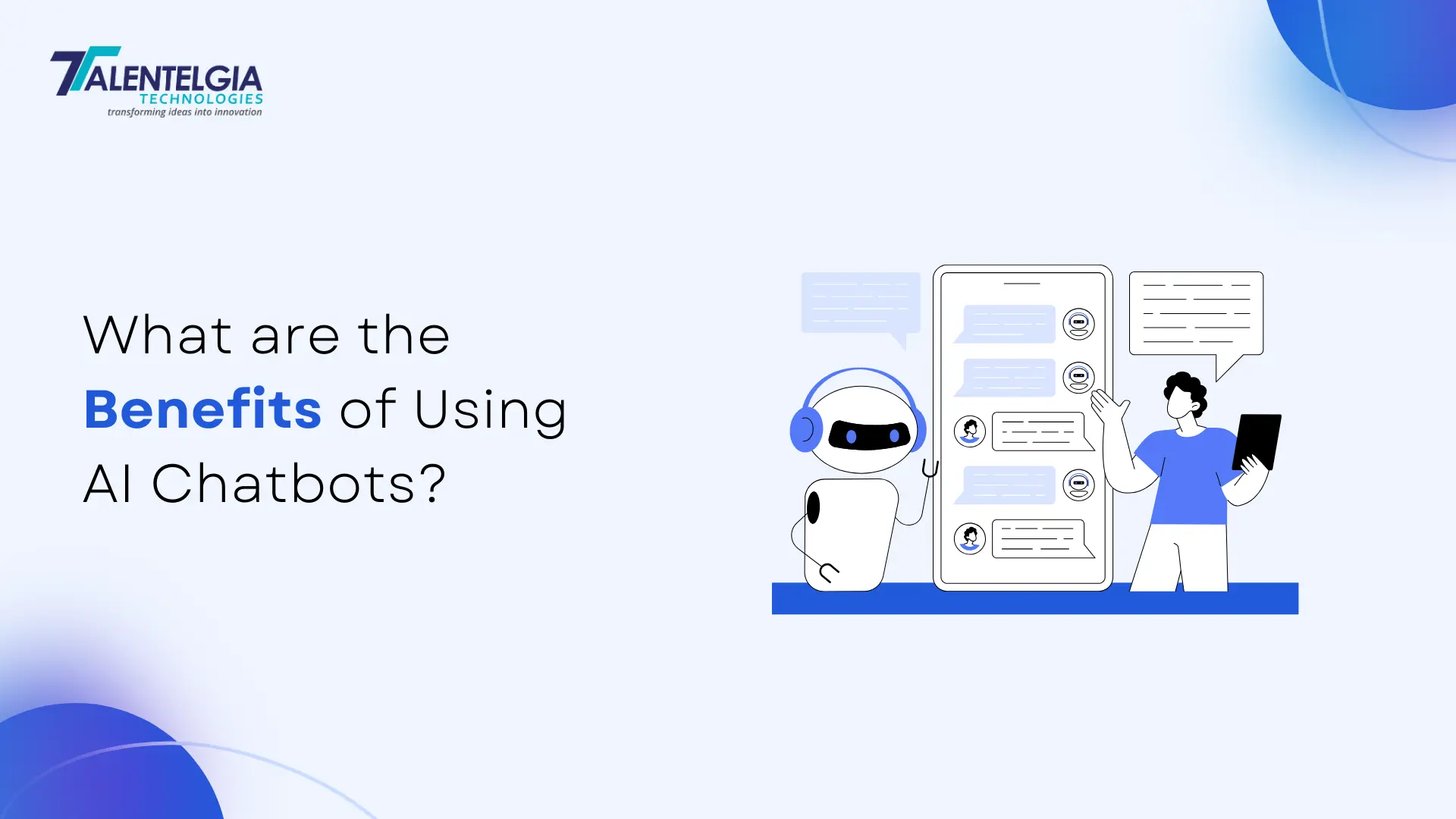



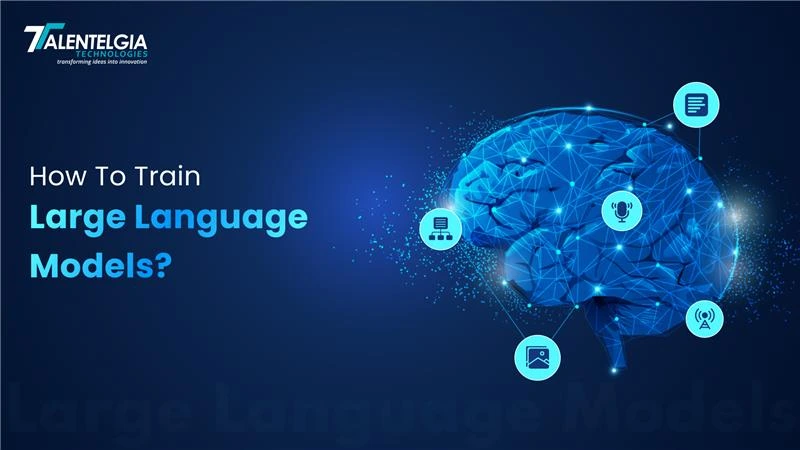
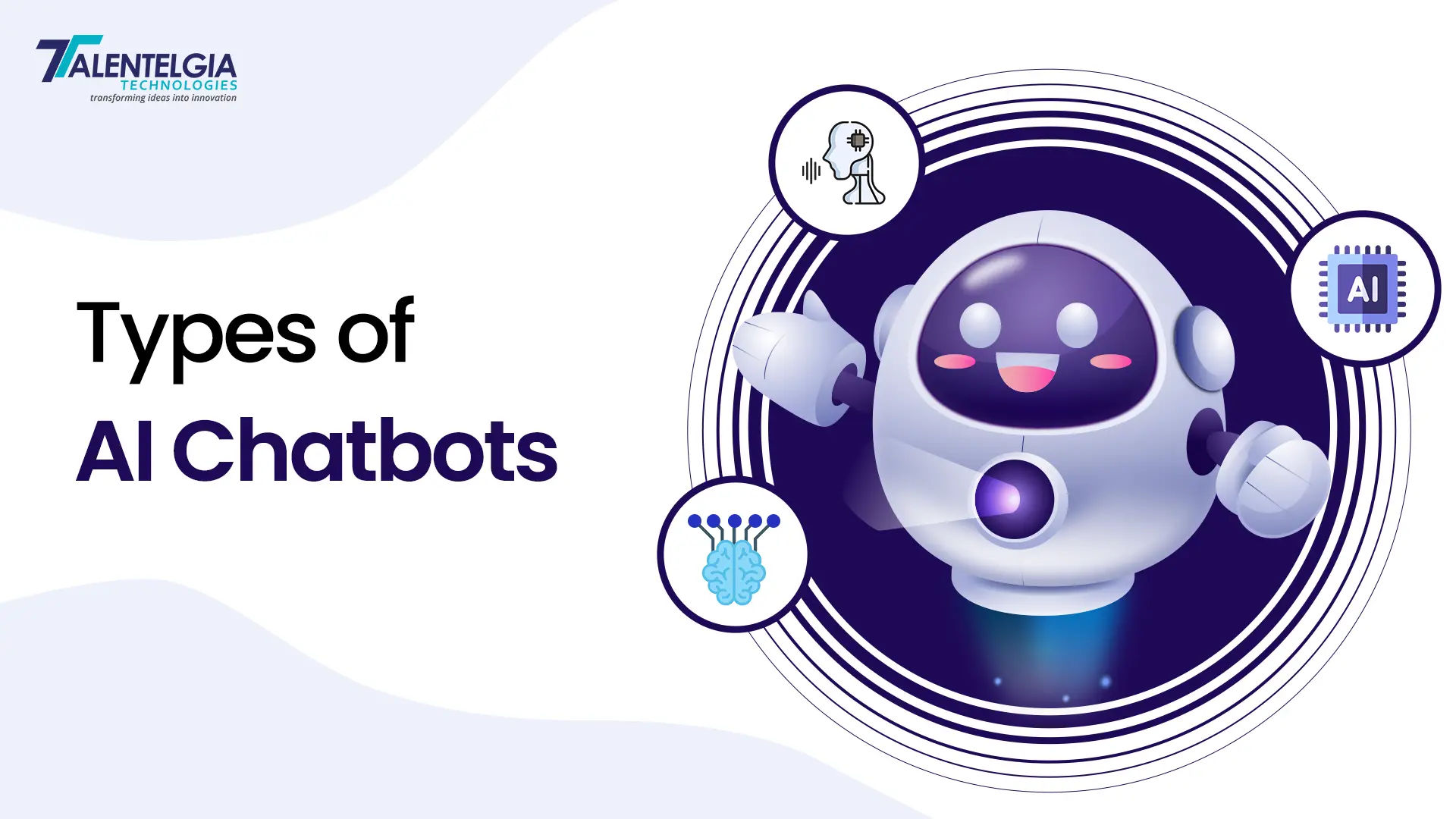












 Write us on:
Write us on:  Business queries:
Business queries:  HR:
HR: 




